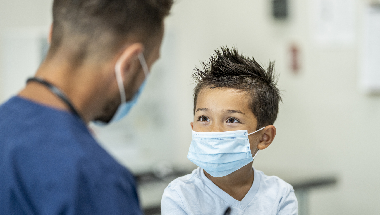
The healthcare system can be intimidating to younger patients, and poor experiences may lead to anxiety around engaging with the system later in life and poorer health outcomes. This draft guidance aims to improve the healthcare experience of babies, children, and young people with the hope that this can improve their health outcomes and wellbeing.
The draft guidance emphasises the need to provide children and young people with clear and accurate information which can be tailored to an individual patient’s level of maturity and understanding. Information materials should be developed in partnership with young people and presented in a range of formats using words and images.
The draft guidance also recommends that young people and their carers should be warned that some medical information available online may be inaccurate. They should be advised where they can access additional sources of information about their care or condition that is accurate, credible, and evidence-based.
Dr Paul Chrisp, director of the Centre for Guidelines at NICE, said: “We know that young people are more likely to look for health advice online or on social media so it’s important they are advised which sources are reliable and trustworthy. Younger patients have historically been seen as more ‘passive’ recipients of healthcare than adults, but supporting them to truly understand their condition and treatment can help them to feel more confident engaging with healthcare staff. We’re very pleased that this draft guideline has been developed with input from children and young people, and hope that it will provide healthcare staff with clear guidance on how to engage effectively with younger patients.”
Catherine White, Chair of the Guideline Committee, said: “By placing babies, children and young people at the heart of their healthcare, we can improve not only their experience of the healthcare system but also their health outcomes. An important way to do this is by finding ways to communicate with children and young people in a way that is engaging and understandable. We hope our draft recommendations will enable excellent healthcare experiences and the committee looks forward to hearing feedback about this draft guideline from the healthcare community, including children, young people and parents and carers.”
The draft recommendations also state that children and young people should be involved in shared decision making over their care, and should fully understand their rights and responsibilities about privacy, confidentiality and when consenting to treatment. Conversations should be a two-way street and appointments may need to be lengthened to provide the time to do this.
The draft guidance recognises the important role parents, carers, and advocates play in ensuring younger patients feel supported during appointments, although patients should be offered the opportunity to speak to a healthcare professional in private where appropriate in line with current practice.
Although the recommendations in this draft were mostly developed before the COVID-19 pandemic, the committee has reviewed the draft in relation to COVID-19 and made changes where necessary.
Dr Chrisp added, “We recognise that some of these recommendations, such as allowing children and young people longer to speak to healthcare professionals, could present challenges for some time to come during the pandemic but is something that we should aim to do.”
The draft guidance is out for public consultation until 16 April 2021 and NICE is keen to hear the views of parents and carers of babies and young children, children and young people. Find the draft and participate in the consultation here.